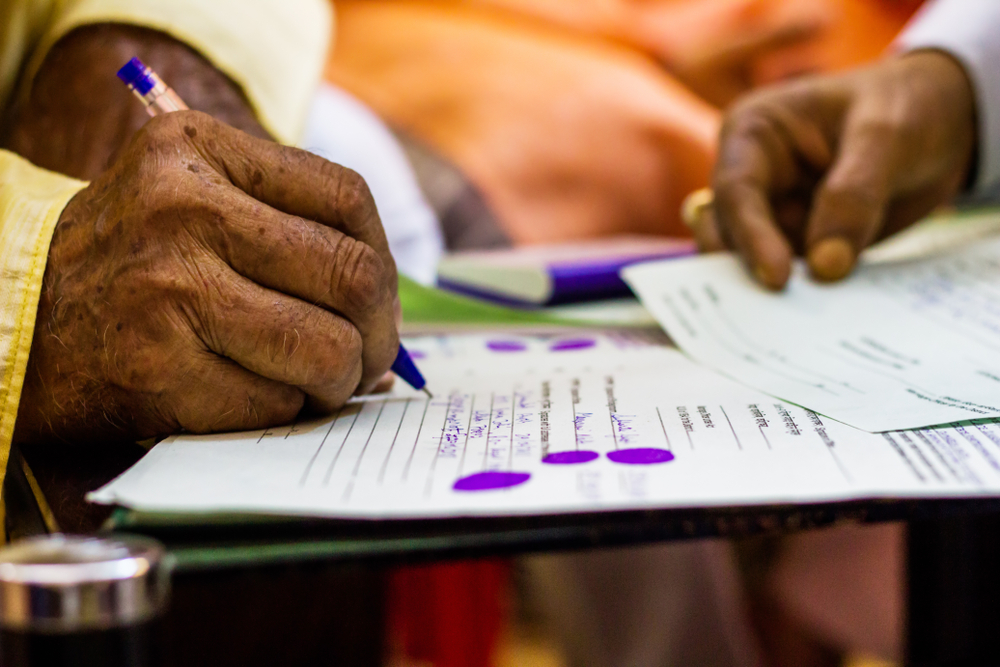
Image from Shutterstock.com.
As an elder law attorney, Kerry Peck frequently files cases involving older adults who are victims of financial abuse.
In one of those cases, a retired professional whose wife had recently died found himself sitting next to a woman who was at least 20 years younger at church. Within weeks, she took him to his accountant and stockbroker to try to access his money and moved into his home.
Peck requested an exam by a physician, who determined the man was cognitively impaired and filed for an emergency guardianship to freeze his assets.
“People are getting more sophisticated in the way they exploit older adults,” says Peck, the managing partner of Chicago law firm Peck Ritchey. “I call these cases ‘sex for signature’ cases. That’s all this is, and it’s an epidemic.”
 As baby boomers age, a growing percentage of Americans are going to be facing the challenges that come along with aging. Are the American courts—and American legal professionals—ready for those challenges? Law & Aging is a new ABA Journal series examining these issues.
As baby boomers age, a growing percentage of Americans are going to be facing the challenges that come along with aging. Are the American courts—and American legal professionals—ready for those challenges? Law & Aging is a new ABA Journal series examining these issues.
Additional Resources
Financial exploitation is just one component of elder law. It’s a growing area of practice that includes not only advance medical directives, estate planning, guardianship, probate and will contests, but also real estate, tax, employment, special needs, discrimination, domestic violence and Medicaid issues.
The number of clients in need of these services is also skyrocketing, due in large part to the aging of baby boomers, the generation born from 1946 to 1964. According to the U.S. Census Bureau, there are currently about 73 million baby boomers.
The oldest members of the group turn 74 this year, and by 2030, all of them will be at least 65.
The Administration for Community Living’s latest report on older Americans also shows that the population of people who are 65 and older increased from 37.8 million in 2007 to 50.9 million in 2017. It estimates that total will reach 94.7 million in 2060.
“Unlike most practices, elder law really focuses on the age of the people who we serve rather than the particular subject areas,” says Shirley Berger Whitenack, a partner at Schenck, Price, Smith & King in Florham Park, New Jersey, and a past president of the National Academy of Elder Law Attorneys.
Whitenack, who started her practice in 1985, adds that unique issues facing baby boomers also make elder law different today. One of those issues arises from people of that generation living in a different financial reality than that of their parents, most of whom received pensions and Social Security retirement benefits.
Many baby boomers will receive fewer benefits, she says, which could lead to problems with financing their long-term care at home, in assisted living facilities or in nursing homes. If they are not veterans or do not have long-term care insurance, they may have to rely on Medicaid once they run out of money.
“Medicaid planning is a minefield, and it’s fraught with all kinds of traps for the unwary,” Whitenack says. “It really does call for counseling by good elder law attorneys.”
Karen Buck is the executive director of SeniorLAW Center, a legal aid organization in Philadelphia that focuses on protecting the rights of the elderly. Many of her clients are living on $500 to $1,000 a month and face various challenges with mobility, transportation, language access, mental health and disability.
“If you are facing any of those and you are on a fixed income, life is that much harder,” Buck says. “If you are about to lose your home, or someone scams you, or some other major legal issue has happened to you, it really can devastate your life.
“That can be true of any low-income person, but especially of a lower-income elder person.”
In addition to common challenges, Buck has seen a significant increase in clients raising their grandchildren, an issue she says is exacerbated by the opioid crisis in Pennsylvania. They often need help navigating complex family law matters, as well as related housing and health care issues.
Camilla McRory, an elder law attorney with her own firm in Rockville, Maryland, agrees that “virtually every elder law case is like a bar exam question.”
In a recent matter, she helped an elderly woman order a medical evaluation of her husband to determine whether he should be moved into a skilled nursing facility. He had been diagnosed with Pick’s disease, a type of age-related dementia that affects the frontal lobes of the brain, and became violent.
 Image from Shutterstock.com.
Image from Shutterstock.com.Once that was decided, McRory had to help the woman convince her husband to move as well as assist her in selling their house and purchasing a condo with less upkeep.
While elder law has always been an “anything-can-happen practice,” McRory says the recent developments she has seen are with attorneys. They have grown more skilled, not only in the different practice areas that impact elderly clients, but also in their medical issues.
“People think they are talking to a medical person sometimes because we have to learn so much of this stuff just to be able to serve our clients,” she says. “It’s important to convey how interdisciplinary and holistic this is.”
Peck adds that attorneys who don’t practice elder law also need to understand cognitive impairment and how it can affect their clients and their matters.
“You need to know your ethical obligations to determine if someone is mentally competent,” he says. “These issues are not limited exclusively to people who do estate planning or elder law, because people get old and people get sick.”
See also:
ABAJournal.com: “As America’s population ages, demand for elder law attorneys grows”
ABAJournal.com: “House of Delegates focuses on seniors’ needs in pair of resolutions”
ABAJournal.com: “Have you adapted your law practice for an aging population? If so, how?”
